May 20, 2025 | 08:02 GMT +7
May 20, 2025 | 08:02 GMT +7
Hotline: 0913.378.918
May 20, 2025 | 08:02 GMT +7
Hotline: 0913.378.918
On October 25, the Ministry of Agriculture and Rural Development (MARD) organized the “Workshop on Women Empowerment Approaches in Rice, Potato, Pepper, Coffee Value Chains”. The workshop aims to share experiences and initiatives to promote the role and rights of women through multi-party cooperation programs in the agricultural product value chains.
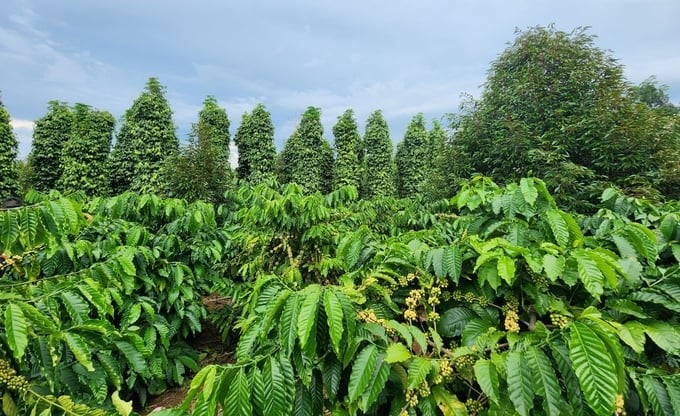
The coffee garden of Ms. Mai Thi Nhung’s family received support and training from the NESCAFÉ Plan program. Photo: Quang Yen.
As the female leader of a farmer group under the NESCAFÉ Plan program, Ms. Mai Thi Nhung (living in Ea Tieu commune, Cu Kuin district, Dak Lak) said that she has participated in the NESCAFÉ Plan since 2015 with the goal of accessing knowledge and practices of sustainable agriculture.
According to Ms. Nhung, before participating in the program, her family cultivated coffee according to traditional practices. Coffee trees were old and stunted, with the use of old varieties and low productivity and quality. The coffee output only reached about 2.5 tons/ha. Furthermore, unsustainable agricultural practices caused the cost of fertilizers and pesticides to increase highly, so her family could not calculate costs and profits.
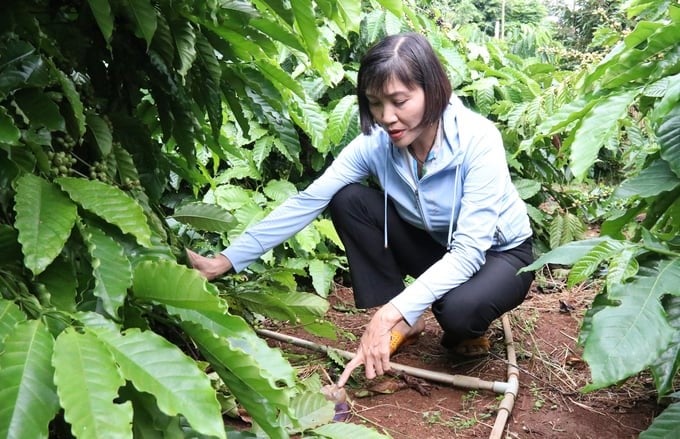
Ms. Mai Thi Nhung said that using bottles to measure soil moisture in farming helps save irrigation water and related costs. Photo: Quang Yen.
Since participating in the NESCAFÉ Plan program, Ms. Nhung was instructed to apply a reasonable model of intercropping coffee and pepper, so coffee output in 2022 reached 3.5 tons of beans/ha, pepper output reached 2.5 tons/ha, and durian output reached 1.5 tons/ha. She was also trained on sustainable coffee farming techniques in the direction of regenerative agriculture.
Ms. Nhung has applied the knowledge she has learned to the coffee garden. Increasing organic fertilizers helps reduce chemical fertilizers by 20–30%, and composting coffee husks as biofertilizer helps improve soil, increase microorganisms, and help the soil become more unconsolidated than before. Using water bottles to measure soil moisture and cow's milk cans to measure rainwater helps her family save nearly 50% on irrigation water and related costs compared to before.
Especially, Ms. Nhung's family also received the program’s support on applying digital transformation through the Farmer's Diary application on the phone, helping to track investment costs and profits from coffee and pepper.
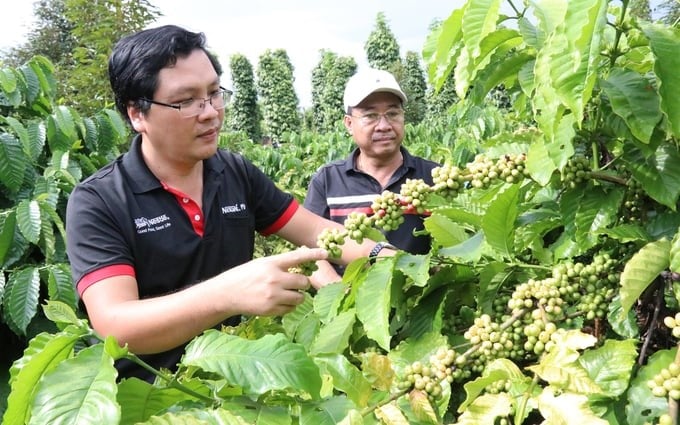
NESCAFÉ Plan technical staff provide technical guidance to farmers participating in the program. Photo: Quang Yen.
According to Ms. Le Thi Hoai Thuong, Senior External Relations Manager, Nestlé Vietnam Co., Ltd., since 2011, the company has implemented the NESCAFÉ Plan program to introduce sustainable farming techniques and models of regenerative agriculture to coffee farmers.
As of now, Nestlé Vietnam Co., Ltd. has deployed 330,000 training courses on sustainable coffee farming towards regenerative agriculture for farmers, as well as connecting with 21,000 farmer households to help practice sustainable coffee production according to the 4C criteria set.
In addition to indicators on environmental protection, reducing emissions, and improving livelihoods, gender equality and enhancing women's empowerment are also focuses of the NESCAFÉ Plan program. Previously, both genders participated in all stages, from farming to harvesting coffee, but participation in training programs was often undertaken by men.
"The fact that women are not allowed to participate in training will affect their ability to make reasonable decisions in smallholding management. Therefore, the NESCAFÉ Plan program has contributed to changing thinking about the right to access essential knowledge through training sessions as well as women's participation in the decision-making process," said Ms. Hoai Thuong.
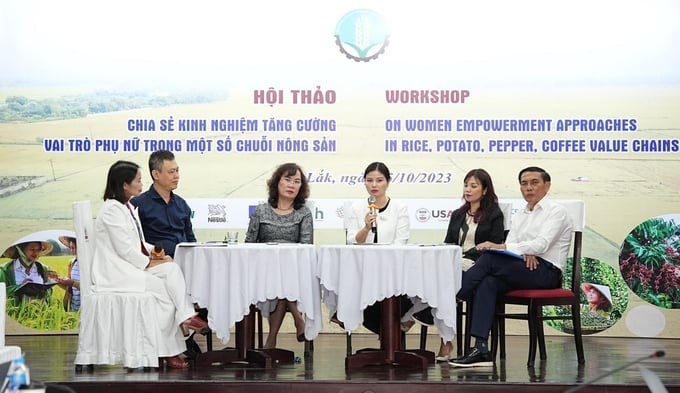
Ms. Le Thi Hoai Thuong, Senior External Relations Manager, Nestlé Vietnam Co., Ltd. (4th from left to right), shares with speakers at the workshop on specific initiatives and activities of Nestlé to promote women empowerment throughout the agricultural product value chain.
When women participate in the program, their decisions have more basis and voice in the family and community. Of the 21,000 farmer households participating in the NESCAFÉ Plan program, with 274 farmer groups, more than 30% of women are holding the role of group leader. They are group leaders and become better inspirers and persuaders in the community.
As the chair of the workshop and Director of the Partnership for Sustainable Agriculture Vietnam (PSAV) Secretariat, Mr. Nguyen Do Anh Tuan, Director of the International Cooperation Department (under MARD), emphasized that it is impossible to neglect enhancing awareness and capacity on aspects of gender equality and women's empowerment in the food and agriculture fields.
Currently, female workers in the agriculture field account for over 47%. Especially in cooperatives, they account for 80%. This figure shows that women have been making many positive contributions to economic and social development, especially in agriculture.
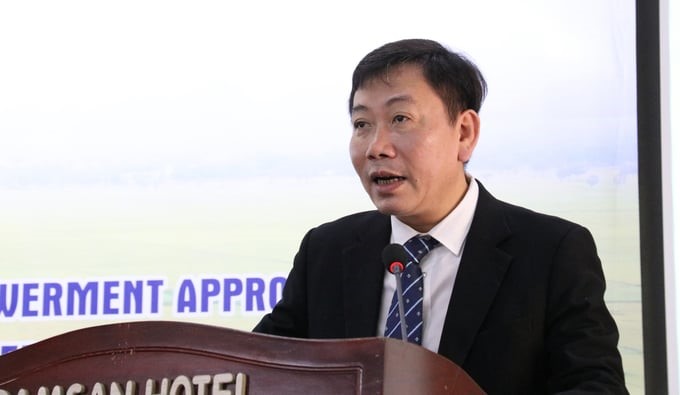
According to Mr. Nguyen Do Anh Tuan, Director of the International Cooperation Department (under MARD), if women are not guaranteed rights and opportunities to participate in the agricultural production process, agricultural models will lack the diversity and creativity that women can contribute. Photo: Quang Yen.
"Women play an important role in ensuring a sustainable future, but often face many difficulties in participating in all aspects of the value chain, as well as limited access to resources, opportunities, and rights. The lack of women’s empowerment also affects sustainable development in agriculture. If women are not guaranteed rights and opportunities to participate in the agricultural production process, agricultural models will lack the diversity and creativity that women can contribute," Mr. Tuan said.
According to Mr. Tuan, enhancing the role of women in agriculture requires a focus on building gender equality relationships, providing training and development opportunities for female farmers, and creating an environment promoting equity.
This requires great awareness, support, and effort from not only the Government but also the private sector, businesses, and social organizations to jointly participate and ensure that women have an important and equal role in agriculture, contributing to the sustainable development of the industry.
This is the first separate workshop on gender equality and women empowerment in the agricultural product chain to be held, with the participation of representatives from the Ministry of Agriculture and Rural Development and the Central Vietnam Women's Union, leading businesses, consulting organizations, representatives of farmer groups, and relevant branches.
Translated by Huyen Vu Thu

(VAN) Vietnam aims to become a 'leader' in the region in the capacity and managing effectively soil health and crop nutrition.
![Reducing emissions from rice fields: [Part 1] Farming clean rice together](https://t.ex-cdn.com/nongnghiepmoitruong.vn/608w/files/news/2025/05/05/z6509661417740_a647202949c539012a959e841c03e1d3-nongnghiep-143611.jpg)
(VAN) Growing clean rice helps reduce environmental pollution while increasing income, allowing farmers to feel secure in production and remain committed to their fields for the long term.
/2025/05/19/5136-1-144800_230.jpg)
(VAN) The Nghe An Provincial People's Committee has just approved the list of beneficiaries eligible for revenue from the Emission Reductions Payment Agreement (ERPA) in the North Central region for the year 2025.

(VAN) 14 out of 35 domesticated elephants in Dak Lak province have had their living conditions improved, with 11 of them currently participating in the non-riding elephant tourism model.

(VAN) Muong Nhe Nature Reserve hopes that being upgraded to a national park will lay the foundation for forest protection efforts to be carried out in a systematic, modern, and sustainable manner.
/2025/05/16/3923-2-171845_52.jpg)
(VAN) Lower costs, higher yields, and improved soil quality are outstanding benefits that soybeans bring when integrated into the crop rotation system.

(VAN) The 'For a Green National Environment' programme aims to promote a green lifestyle, support businesses in implementing ESG practices, and turn Net Zero commitments into concrete actions.